S.K. Dunstall's Blog, page 16
April 8, 2019
The dream versus reality
Where I’d like to be …

Where I really am.

Sigh.
March 31, 2019
How long does it take to write a book?
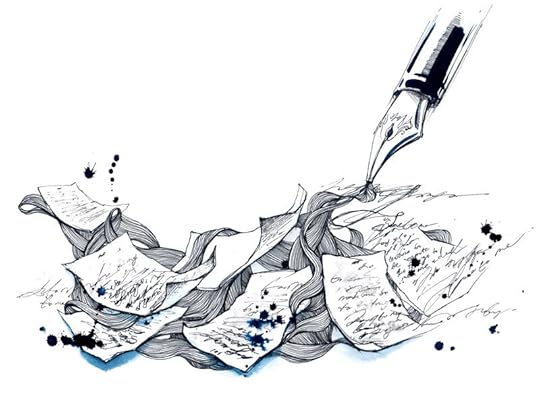
One piece of writing advice I’ve heard is that if your book
takes more than a year to write, then you should dump it and start another one.
I can see some merit in a very small part of this, but no, if
we dumped our novels after twelve months, we’d have a string of unfinished
stories behind us.
I think where the advice comes from is that you shouldn’t take forever to write your first draft. Stephen King says three months, which would be nice if you can do it, but a lot of us can’t. I’m more in favor of so long as you keep plodding along, and getting further into the story, then keep writing.
In an ideal world, the first draft is written quickly. But remember, for many people, that first draft is very basic. Many of them are skeletons of what is to come, way short of the word count. For others (like us) they’re often the opposite. Long, rambling epics we need to trim. The most important thing is that you keep writing.
Many non-writers are surprised at how long it takes to write
a novel. Ours certainly take a long time.
Years. Unless we’re under a deadline,
and that speeds things up considerably.
Let’s look at the timing of some of our books.

Linesman
Started: 18 July 2010
Finished draft 1: 29 January 2012
Four months and four drafts later we sent a draft to Caitlin,
who’d just become our agent.
For the next year we wrote new stories while the novel did
the rounds with the editors. Then, when it
looked as if Linesman wasn’t going to
sell, we did a major rewrite at the agent’s recommendation, from the feedback
from the editors. Our final version was completed in September 2014.
All up, four years.
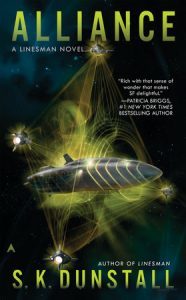
Alliance
Alliance was written
under contract, and we hadn’t started it before we wrote the contract. It’s one
of the fastest books we wrote.
Started: 16 February 2014
Finished draft 1: 7 December 2014
Final to editor: 10 August 2015

Confluence
Likewise, Confluence
was written under contract and we hadn’t started it prior. We were still finishing this the day before
we sent it through.
Started: 1 February 2015
Final to editor: 21 May 2016
I don’t have a first draft completion date for this one.
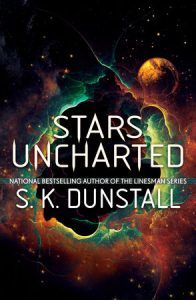
Stars Uncharted
We started Stars
Uncharted while Linesman was doing the rounds to editors, before Anne (editor)
had asked for a three-book series about Ean Lambert. Linesman
didn’t look as if it would sell, so Caitlin (agent) suggested we write something
else altogether. (We weren’t sitting
around before that, by the way, we were writing stories in the Linesman
universe, but not series books.)
Started: 15 August 2012
Finished draft 1: 1 August 2013
Started the rewrite: 4 April 2016
Final to editor: 9 May 2017
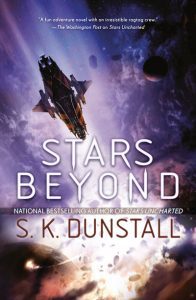
Stars Beyond
Stars Beyond has
had a few changes. It, too, was under
contract, but because the time between books was so long, we had plenty of time
to write it. Except, that we went off on a tangent, then went off on a
different tangent, and finally found our path very late. Our original delivery
date was 31 May 2018.
Started the original story: 24 February 2017
Rewrote after talking to editor: 29 October 2017
Sent to editor (and agent): 31 May 2018
Agent recommends rewrite: August 2018
Final copy sent to editor: 31 January 2019
As you can see. It takes us a while to write a book.
March 24, 2019
Progress report
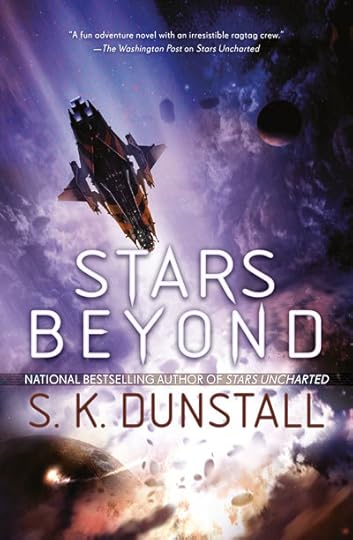
We got the edits back for Stars Beyond early this week.
The changes our editor asked for weren’t too bad. Although, I have been rereading the story
since, and some of the word choices in the first four chapters sound flat.
It doesn’t take much to fix. Little tweaks here and there, but I’m relieved we’ve had enough time away from the book to pick them up.
Edits are due back by early May. We have some work to do.
March 17, 2019
A tale of two movies

Today I saw Captain Marvel.
It was great. I enjoyed
it. Lots of fun, with a decent plot.
I say this, because I also recently saw Alita: Battle Angel, and I have to say that the world building in Alita was beautiful, and the effects were excellent, but the story was ordinary. It didn’t finish, and what little story there was didn’t have much substance. Or there was a story, I suppose, a bad guy after Alita for [redacted, because spoilers], but that was it. It was all setup for movie two.
It wasn’t like Captain Marvel, which had plot twists and
pathos, and things ended quite differently to how you thought they would at the
start. I came out of that movie satisfied. I came out of Alita feeling frustrated.
It’s been a long time since my last movie, and longer still
since my last Marvel Universe movie. I confess, I was somewhat fatigued by
superheroes of any sort. I just couldn’t
go to another one.
I sometimes feel that way with books. I binge read a series of books and then one
day I can’t face the next in the series.
Thankfully, I’m over that for the moment with superhero movies,
and I’m looking forward to the Avengers Endgame next month.
March 9, 2019
Opinionated about hamburgers
 I like the meat to be half this thickness, or even less.
I like the meat to be half this thickness, or even less.Am I the only person in the world who likes thin hamburgers?
When I was a kid, a hamburger with the lot doubled the size
of the bag you got. The egg and the
bacon together easily matched the height of the burger. And you could still get
your mouth around the whole thing to take a bite.
Just to be straight, I’m talking the Aussie version of the
hamburger here. A regular hamburger is
tomato, lettuce and cheese with a meat pattie—and because it’s Australia, possibly
a slice of beetroot too, although I have to admit, I always ask for my burgers
without beetroot. And, sacrilege, I also
ask for it without tomato sauce. How un-Australian
can I be?
A burger with the lot is a plain hamburger, with the addition
of egg, bacon, cheese and onion. Some people also put a slice of pineapple with
it.
The meat patties are growing. They started out a centimetre, maybe one-and a
half centimetres in thickness. Now they’re
creeping up past two, and on to three centimetrs. I can’t even get my mouth
around some of them. Then there’s this
trend for putting double, and triple patties into the burger.
I like my burger meat thin enough so I can eat the burger
without needing a knife and a fork.
As for the buns they’re served in … don’t get me started.
March 2, 2019
Which stories will I nominate?
 Dublin’s Samuel Beckett bridge, where I won’t be this August, but everyone going to Worldcon will. (We will be in Wellington next year, though. :-))
Dublin’s Samuel Beckett bridge, where I won’t be this August, but everyone going to Worldcon will. (We will be in Wellington next year, though. :-)) I’m a supporting member of Worldcon, which means I don’t get to go to the conference, but I do get to nominate and vote for the Hugo awards.
I read somewhere that less people nominate than vote for the awards, so since I’ve been a member I make a point of nominating, rather than just voting.
I feel as if I haven’t read a lot of the favorites this year. I’m not sure why. Whether we were just too busy writing, or whether I simply read a lot of old books. For example, I read Katherine Addison’s The Goblin Emperor twice. Cried both times, for all that it’s such a hopeful book. Maia is such a beautiful person.
But, that’s not talking about books I’ve read that are
eligible to be nominated for this year’s Hugos.
Novels
I enjoyed John Scalzi’s The
Collapsing Empire.
I read Naomi Novik’s Spinning
Silver. I liked it better than I liked Uprooted,
so that’s on my list.
C. L. Polk’s Witchmark,
which I thought nobody but me had read by the publicity it was getting, but
suddenly it’s popping up on a lot of lists—including the Nebula list.
There are a few 2018 books I have bought to read but haven’t yet. And I can’t vote for our own book, even though it was published last year, too. That would be unethical. So I’ll probably stick with nominating the three above. Unless I get caught up on some reading between now and the middle of the month.
Novellas
No question here. Martha Well’s Murderbot series. Artificial Condition,
which was book two, and Rogue Protocol.
Of the two, I preferred Rogue Protocol
the most, but I enjoyed them both.
I read somewhere that in a book series like this, people often prefer the last book in the series. I don’t know how true that is, but I did think book three was best (out of two and three. All Systems Red is still my favorite.)
I’m voting for both of these.
If I get time I’d like to read Aliette de Bodard’s The Tea Master and the Detective. I’m
intrigued by that one.
Best professional
editor long form
It’s no surprise to say one of my nominees will be Anne
Sowards. She’s our editor, and she’s great. If you want to see a list of books
she edited in
2018, it’s here.
Best series?
I’m still thinking that one through. Still finding my way
around the rules on that one.
Best movie
This wasn’t a big year for movies for me. I enjoyed Black Panther.
I won’t nominate Infinity War. It had some good parts, but it was too bitsy for me. There were too many characters to allow one storyline to shine. Except Thanos, so I suppose it was really Thanos’s story. If it was Thanos’s story, then the storyline complete.If it was an Avenger story, it didn’t. Most frustrating.
John W. Campbell
As for the best YA and the Campbell award, I’m still
thinking these through. We’ll see what I’ve decided come March 15.
February 26, 2019
Saving the minutiae of someone’s life
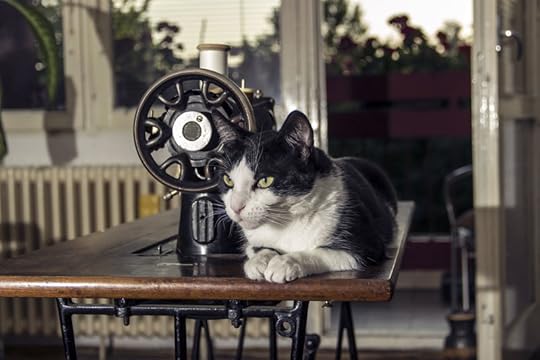
Status this week — so tired I created this post on Sunday and didn’t realize until Tuesday that I hadn’t actually taken it out of draft mode. Beware typos, that’s all I can say. I tend to omit words when I’m tired. Especially at work. The last two days some of my emails haven’t made sense. It’s getting embarrassing.
Packing up the after-effects of someone’s life, especially
someone you love, is always depressing. And
you can’t keep everything, even if you want to, you don’t have the room.
It’s taken us a long time—nearly eighteen months—to clean
out our mother’s house. The big items
are easy to get rid of. Give it to
someone in the family if they want it, pass it on to a local charity if they
don’t.
It’s the little things that are harder. Like letters.
What do you do with them?
Mum was a big letter writer and receiver, and she kept all
the letters she received. We’d find as
we went through them we’d lose hours in the letters. In the end we just kept moving the pile (that
kept growing) as we emptied the house.
But finally, there’s nothing left but the letters, and we
still have to make a decision as to what to do with them.
We can’t keep them all.
We don’t have the room. We don’t even want to read them all. They’re her correspondence with her friends
and family. In some ways it feels rude
to read them.
In the end, we’ll probably throw many of these letters out.
All over the world, other people are faced with the same
decision we are.
Mum is from the last generation of people who lived most of their lives offline.
From here on people started to live part of their lives online, and in future I imagine we’ll be able to search and find something about them. (Maybe, if we can get through the overload of information.)
But not for Mum.
I can’t help wondering if, in years to come, we’ll wish we’d kept those letters instead of making room for the antique sewing machine.
February 16, 2019
Moving the plot around
First, some book news. The publication date for Stars Beyond has changed. It’s now January 20, 2020.
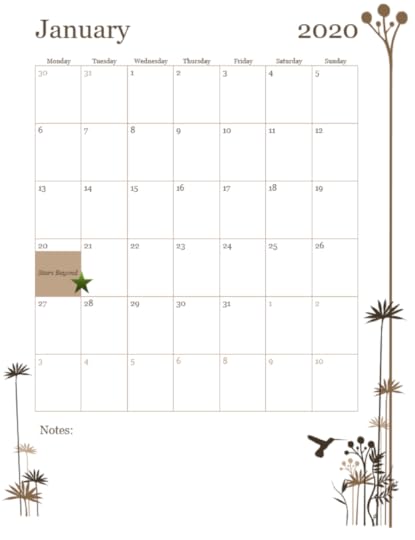
Plotting
While we’re waiting for the edits back from Anne, we’re working
on another book. (We’re always working on a book.) We haven’t spoken to our
agent about this one—yet—as we’d like to get it into better shape before we do.
It’s one we’ve been working on a while. Past first draft, onto its fourth of fifth.
Last time we looked at this story, we thought it was okay.
One draft away from sending to our agent.
We reread the story, still laughed at the funny bits, and still
liked the characters. This time we saw a few things we could change, though. There
were a couple of minor continuity issues, plus some very short chapters. One-or-two-page
chapters, in fact.
This is the difference time away from a story makes. Around about now in any story, we do a chapter outline. This is to ensure the story works, to see if there are any big holes, and to check if the timing works. Because we knew there were so many short chapters, this time we summarized each chapter in Post-It notes and put the Post-It notes onto a wall so we could move them around.
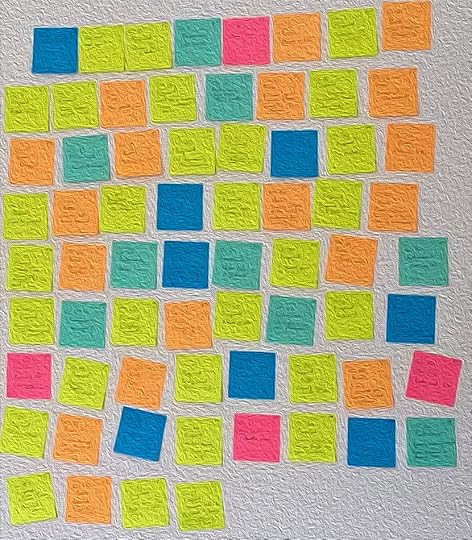
This is the first round. If you count, you will see sixty-eight Post-It notes. (Note that you can only see the Post-It notes, not the story, as we don’t want to give away the plot. :-))
The story is currently 105,000 words, and we go roughly 250
words per page. That makes each chapter on average around six pages. That’s
short. We try to make them around 20 pages per chapter.
A little bit of reorganising is required.
Note too, that the Post-Its are color-coded for character point-of-view. There are five colors on that wall. Two is good, one is better. Not five.
So, we reorganized.

We got down to forty-five Post-Its. That’s still too many, but it’s getting better. We’ll work on it. We even combined points-of-view in two places (the Post-Its that have two colors). We did a lot of moving around the story to get this far.
Maybe we’re not as finished as we think we are.
February 9, 2019
Evolution of an idea. Maybe.
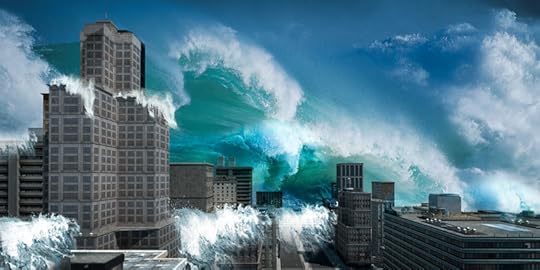
If dreams are your mind’s subconscious, then my mind is in
dire straits right now. Every few weeks I have a dystopian dream. What’s more,
I remember it when I wake up.
I find I dream three types of dreams.
Those I remember, those I don’t, and those where I don’t
remember dreaming but I go to sleep thinking about something and wake in the
morning to find whatever issue I’m thinking about—writing or real life—is solved,
and I think I remember dreaming about it, but I’m not really sure.
The dreams I don’t remember are often good story dreams. I
wake up and think, “Oh, that’s a brilliant idea. I must write that down.” By
the time I have pen and paper in hand I’ve totally forgotten what the dream was
about. Yet I know it was a good idea.
Those where my subconscious solves a problem for me may or
may not be dreams, but I wake in the morning thinking, “Why is that even a problem,
my characters can do this?”.
Then I have these
crazy dreams, roughly one a month, where an idea pops up that’s so horrible and
I don’t want to write it.
Like last night’s dream, which was set in a future Earth where sea levels had risen with global warming. The action was all contained in a massive, high-rise former resort that had been built on an island. The lower levels were now flooded, of course, and everyone lived in the upper levels. The lifts didn’t work—of course—so they had to use the stairs, which were well-protected, or the lift wells, which were risky. The island it had been on (all underwater now) was isolated enough that the inhabitants seldom received visitors. There were dangerous storms at various times of the year.
The dream included political machinations, a visitor from beyond,
war between the levels. All-in-all, your standard dystopic, closed system that
you can read about in any of a hundred (probably thousands of) books right now.
Arrgh.
I told Sherylyn my dream. “If you want it, you can have it,”
I said. Because sometimes an idea that one person doesn’t like appeals to the
other, and they can turn it into a story both of us like.
“It sounds awful,” she said.
I walk around all morning with the idea still sitting in my
mind. And eventually I realise … the dystopia has gone. I can’t remember the politics
or the fights, or the visitor. Or not clear enough to describe any more. What I
can remember is this massive building—big enough to hold 5,000 people—jutting
up out of the ocean.
Now that’s something I can use in a story.
February 2, 2019
Celebrating book milestones
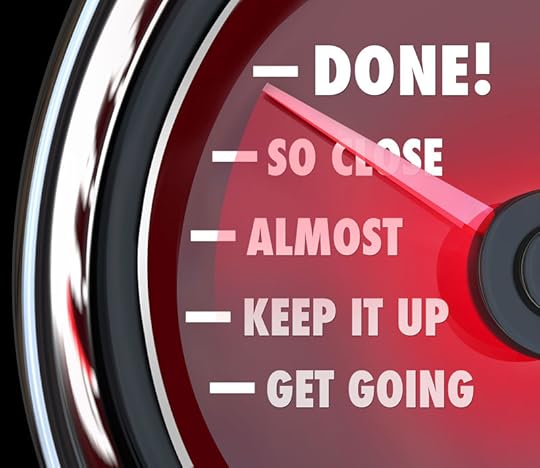
January 31 was a writing deadline for us. The rewrite of Stars Beyond was due to our editor.
There was the usual ‘do not press send’ moment where you open the email attachment—to check if you had sent the right document, and that it was formatted properly—only to see a really clunky, wince-making phrase on the first page, plus two clumsy transition sentences and another clunky turn of phrase on page two. It’s not as if we haven’t spent months working on the thing, or that we haven’t read that page plenty of times before, but there’s something about that final email that makes poor writing stand out. I wish my email had recall and resend.
Afterwards we ate dinner. We may have had a glass of wine (three days ago is a long time now), but I don’t recall. Work-wise, I was super busy and had something I needed to finish afterwards.
It got me thinking about how we celebrate book milestones,
and what we do celebrate.
It seems to consist mostly of eating out and drinking a lot. 



